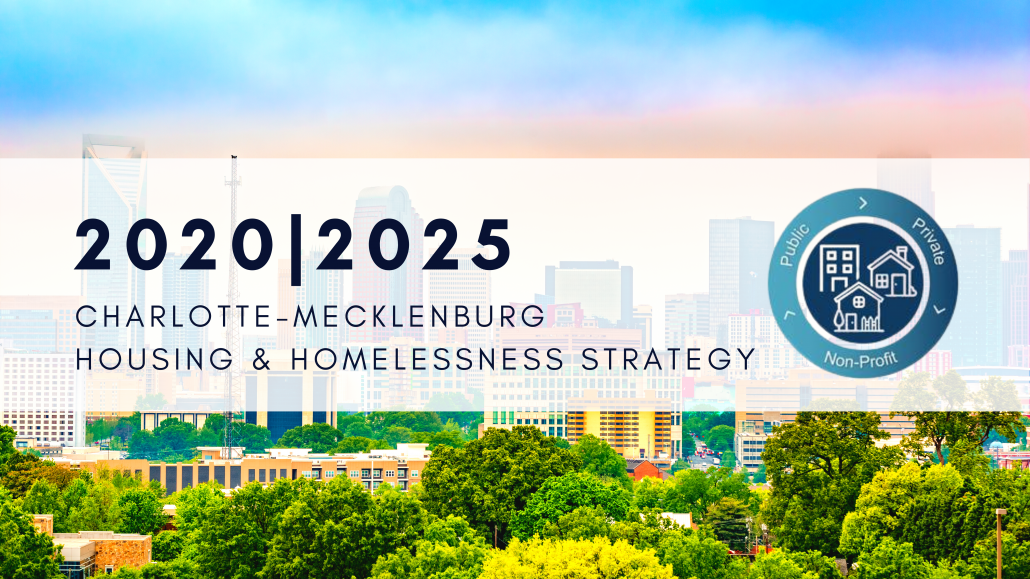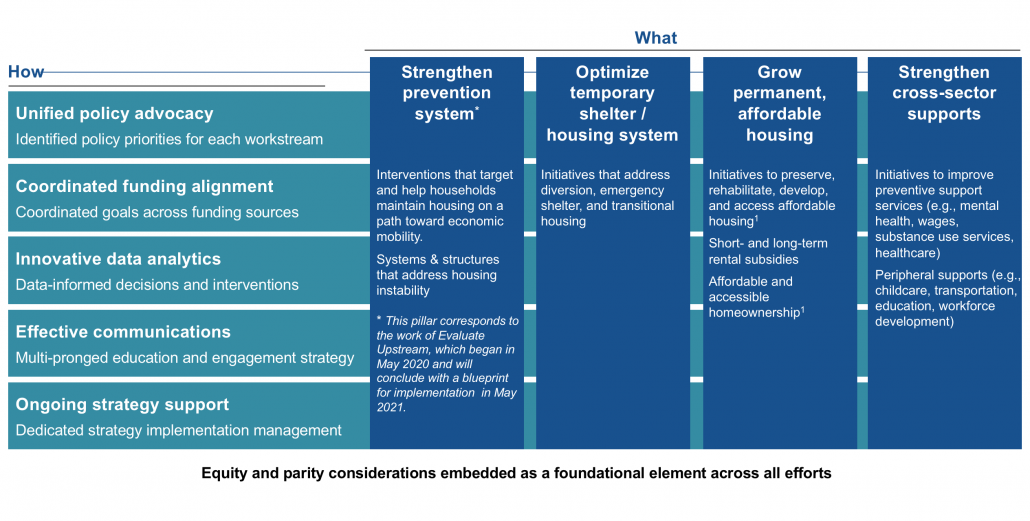Cathy Bessant
Chief Operations and Technology Officer
Bank of America
Eugene A. Woods
President and CEO
Atrium Health
Today a broad consortium of the public, private and non-profit sectors is pleased to announce the launch of a comprehensive community-wide effort to create a strategic plan around housing instability and homelessness in our community: 2025 Charlotte-Mecklenburg Housing & Homelessness Strategy.
As co-chairs for the working group which is launching the new strategy, we are pleased to share that nearly 50 city, county, corporate and non-profit leaders, including those who serve on the front lines of housing instability and homelessness and those with lived experience are all part of this comprehensive community undertaking. And, the effort will continue to grow with more leaders continuing to be added to this team.
By October 2021, this group will have developed and begun to launch a five-year strategic plan to help Charlotte-Mecklenburg become a national leader in addressing current and preventing future homelessness by offering aligned strategies, unified goals, and clear funding pathways. Our shared vision is that homelessness is rare, brief, and non-recurring in Charlotte-Mecklenburg where every person has access to permanent, affordable housing and the resources to sustain it. This plan will be presented to both City and County for consideration as adopted policy.
The same entities, doing the same things, in the same ways, will never produce different results. It is critical that we, as a community, change our approach. The purpose of this community update is to share a more in-depth introduction to this effort, including goals and initial milestones, and what this work can mean for Charlotte-Mecklenburg, and beyond.
WHY WE NEED THE 2025 CHARLOTTE-MECKLENBURG HOUSING & HOMELESSNESS STRATEGY
Charlotte-Mecklenburg has a longstanding commitment to ending and preventing homelessness. Our community has, over time, made significant investments in prevention, emergency shelter and permanent housing. These efforts have only ramped up in response to the COVID-19 pandemic to ensure that every person as a safe place to isolate or quarantine. Housing has always been the launchpad for opportunity; now it is also a tool to address public health.
And yet housing instability and homelessness continues to grow in Charlotte-Mecklenburg. On a single night in Charlotte-Mecklenburg, there are at least 3,000 individuals experiencing literal homelessness, including in sheltered or unsheltered locations. The number of households experiencing housing instability has also risen. And because of the financial ramifications of the pandemic, as of January 2021 there was almost $70 billion owed by U.S. renters in combined back rent, utilities, and late fees.
Such a seemingly intractable problem like housing instability and homelessness necessitates a comprehensive, systemic approach to address the full continuum of need. It also requires both the public and private sector at the table. This new effort marks the first time in Charlotte-Mecklenburg’s history that the public and private sector have come together to address the full housing continuum, from street homelessness, upstream to households experiencing cost-burden.
In addition to Atrium Health and Bank of America, a consortium comprised of representatives from Mecklenburg County, City of Charlotte, Charlotte-Mecklenburg Continuum of Care and Charlotte Center City Partners have provided initial support to lay the foundation for today’s launch. McKinsey & Company is providing a fact-based analysis on a pro bono basis.
HOW THIS EFFORT IS DIFFERENT
The 2025 Charlotte-Mecklenburg Housing & Homelessness Strategy builds upon successes, and integrates lessons learned from more than 20 years of system-focused housing work, including from previous and current community initiatives to address the problems of housing instability and homelessness. Charlotte-Mecklenburg’s first assessment and comprehensive plan was released in the early 2000s, followed by the community’s 10-year plan to end and prevent homelessness.
During the past two decades, the community has taken on chronic and veteran homelessness; centralized and streamlined the intake process for assistance through Coordinated Entry; strengthened both the collection and dissemination of data; developed an ecosystem; reconstituted the Continuum of Care; and, over the past several years, focused upstream on the prevention assistance system. Prior efforts, including the most successful ones, have only targeted a specific piece of the issue, such as chronic or veteran homelessness.
In 2015, Housing First Charlotte Mecklenburg (HFCM) was a public-private venture, launched with the mission of ending chronic homelessness in our community. Chronic homelessness is defined as the experience of homelessness that lasts for more than one year, coupled with a disabling condition. Over a five-year period, HFCM helped house more than 1,000 chronically homeless individuals; connect service providers to clients, and each other; invest in research; and institute systems and accountability measures. Despite that, Charlotte-Mecklenburg still has more than 500 chronically homeless individuals experiencing homelessness, today. Further, that initiative was not intended to address non-chronically homeless individuals and families facing housing instability and homelessness. And it could not foresee the unique challenges of a public health crisis.
McKinsey & Company is helping facilitate the development of a comprehensive plan that will address the full continuum of housing instability and homelessness in Charlotte-Mecklenburg. The three main goals have been identified for this phase of the work, which are listed below:
- To build awareness of; engender support for; and create a strategy that strengthens and increases coordination among and across service providers and systems to reduce and/or prevent housing instability and homelessness; and to forge a path forward;
- To convene and commission a working group of Charlotte-Mecklenburg leaders to own and oversee the implementation of this strategy; and
- To pair the working group, technical committee and workstreams with “best-in-class” systems-change consulting services to help our community understand the problem; support proposed actions; and achieve progress on the adopted comprehensive, systems-focused strategy.
The comprehensive plan will align strategic objectives; employ a common lexicon; describe clear metrics; and develop a multi-year approach to prioritized actions. These actions must include a focus on funding alignment, policy, data, and implementation structure. This effort will also prioritize transparency and inclusivity. It will also be stakeholder-driven, and intentionally coupled with other community efforts, like “Evaluate Upstream.” Evaluate Upstream is a community-wide, systems-change process, focused on preventing individuals and families from ever falling into homelessness; it also considers the impacts of a lack of affordable housing and existing income disparities on homelessness.
To drive transformation, we cannot shore up existing silos, let alone risk creating new ones. The individuals and entities participating seek, instead, to unite and align the work across sectors. We will continue to share regular updates. We will also want to ensure the broadest possible representation on project leadership workstreams, including individuals with lived experience.
MILESTONES
Below are the initial milestones achieved, in the run-up to today’s launch:
- Collected data and research on gaps in the existing housing continuum in Charlotte-Mecklenburg. Compiled best practice solutions, including a community survey, in-depth interviews, and focus groups with over 50 homeless service providers, community and business leaders, funders, people with lived experience, local government staff, housing advocates, residents, and research institutions.
- Developed and designed the approach and governance structure to lay the foundation for a comprehensive, sustainable plan with shared ownership. This structure includes a working group, technical committee, and nine workstreams. The Working Group is comprised of business, non-profit, and public sector leadership to ensure that the work is adopted and owned by the larger community. The Technical Committee includes representatives with specific expertise in the sectors that are impacted by and/or have an impact on housing instability, homelessness, and affordable housing. Finally, nine project Workstreams will be organized around the following four pillars: Strengthen Prevention System (Evaluate Upstream); Optimize Temporary Housing/Shelter System; Grow Permanent Affordable Housing; and Strengthen Cross-Sector Supports. Five additional workstreams will focus on how the work will be accomplished, including: Unified Policy Advocacy; Coordinated Funding Alignment; Innovative Data Analytics; Effective Communications; and Ongoing Strategy Support.
NEXT STEPS
In the coming weeks, project workstreams will begin the difficult work to identify gaps and opportunities for change relative to their assigned areas. Their output will ultimately be synthesized into a comprehensive plan by the members of the Technical Committee and recommended for review and adoption by the Working Group.
To learn more about this work and how to get involved please sign up for more information by adding your email address below. You can also follow this link to the 2025 Charlotte-Mecklenburg Housing & Homelessness Strategy webpage.
SO, WHAT
If Charlotte-Mecklenburg is to avoid the fate of other metro areas struggling to address housing instability and homelessness, it is essential that we chart a new course in the community’s approach to these problems. Our vision is that “Homelessness is rare, brief, and non-recurring in Charlotte-Mecklenburg. And, that every person has access to permanent, affordable housing and the resources to sustain it.”
Although the road ahead will be challenging, we believe that our shared vision is achievable. And to fully realize this vision, we ask that each and every one of us fully lean into this commitment. Once the process is mapped, we will all have a clearly defined role in ensuring that every person, regardless of ZIP code or other circumstance, has not only a home, but a fighting chance at opportunity.
SIGN UP FOR BUILDING BRIDGES BLOG
Cathy Bessant, Chief Operations and Technology Officer at Bank of America, and Eugene A. Woods, President and CEO of Atrium Health, serve as co-chairs for the working group of the 2025 Charlotte-Mecklenburg Housing & Homelessness Strategy.



